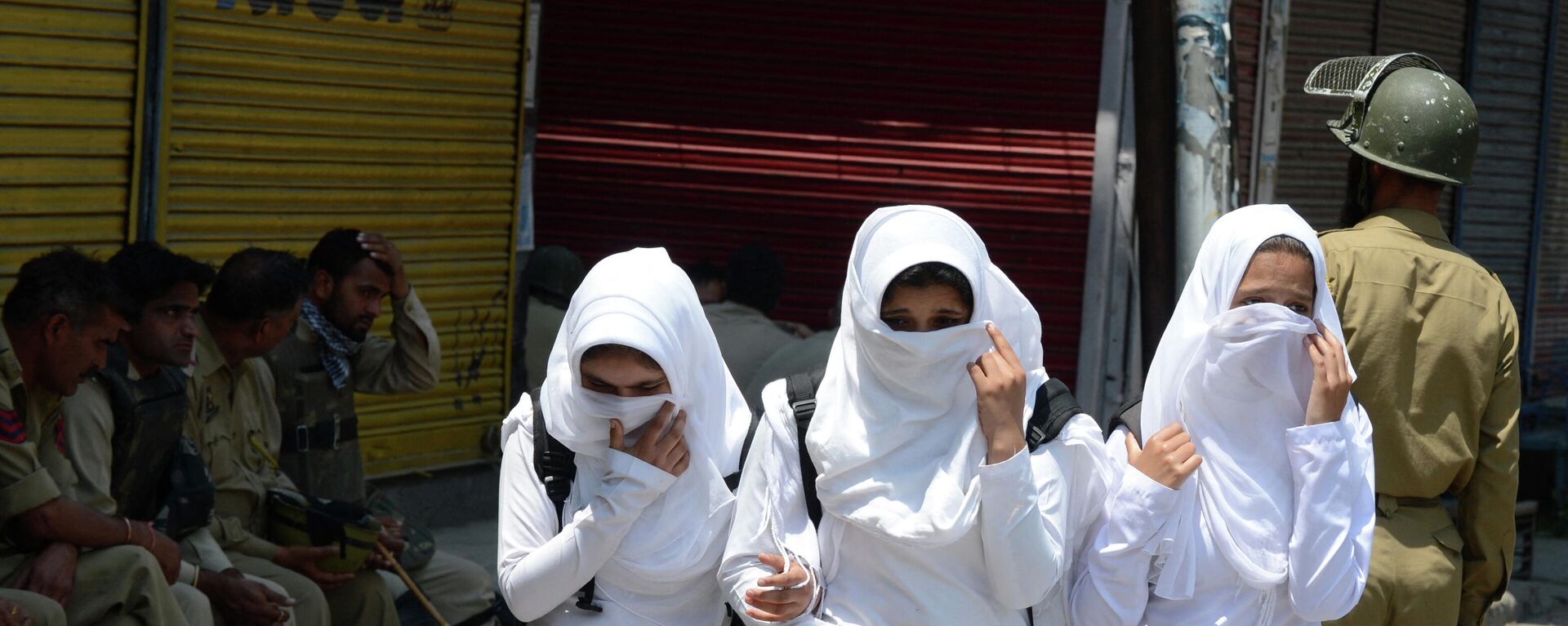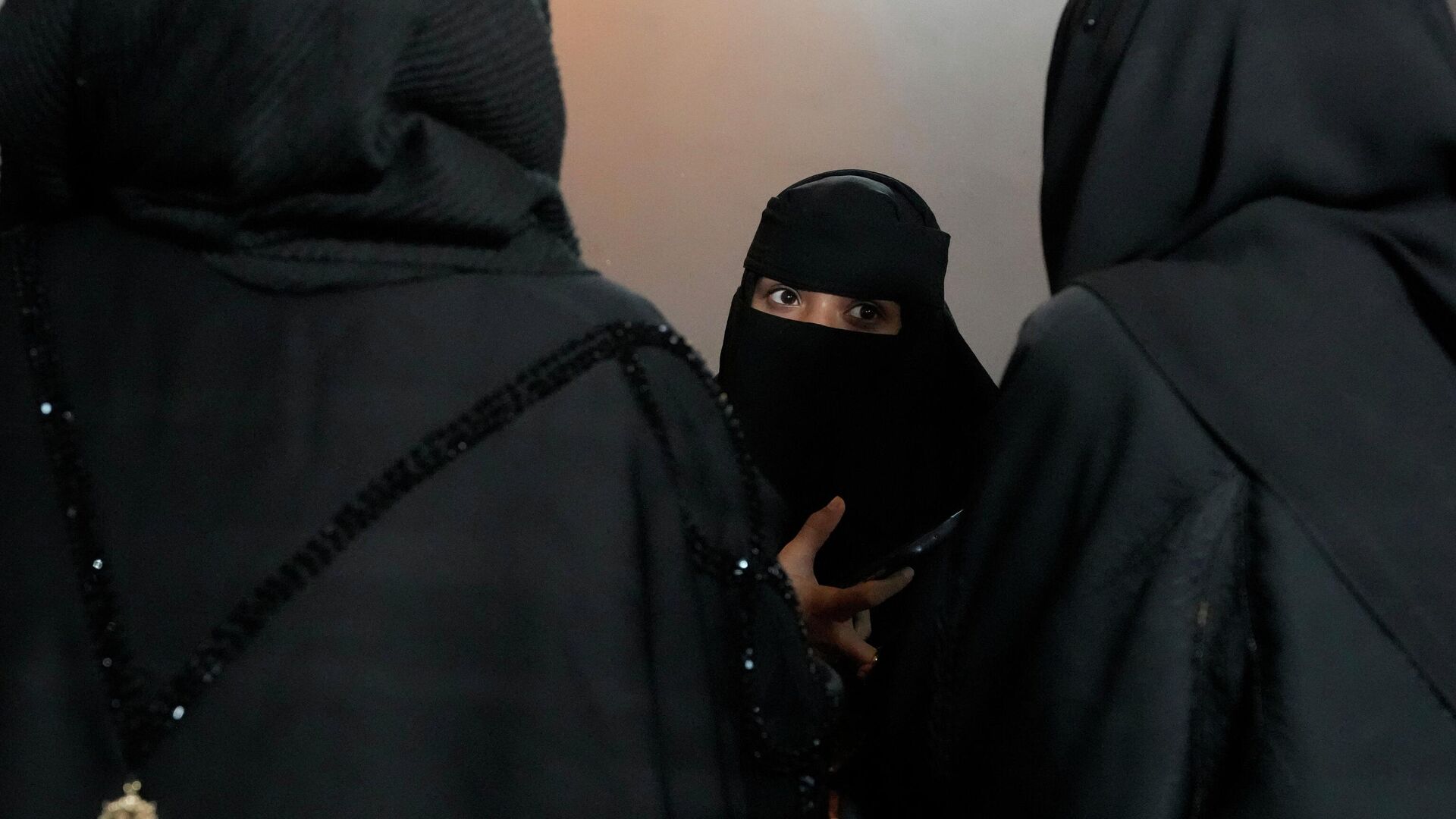https://sputnikglobe.com/20221013/supreme-court-of-india-gives-split-verdict-on-hijab-ban-matter-placed-before-chief-justice-1101791966.html
Supreme Court of India Gives Split Verdict on Hijab Ban, Matter Placed Before Chief Justice
Supreme Court of India Gives Split Verdict on Hijab Ban, Matter Placed Before Chief Justice
Sputnik International
The hijab row started in the Indian state of Karnataka last December, when several Muslim students at the Government Pre-University College for Girls in Udupi... 13.10.2022, Sputnik International
2022-10-13T10:02+0000
2022-10-13T10:02+0000
2022-10-19T18:56+0000
india
hijab
supreme court of india
religion
religion and politics
domestic politics
politics
https://cdn1.img.sputnikglobe.com/img/07e6/0a/0d/1101798265_0:0:3072:1728_1920x0_80_0_0_37efafec79f794662626ee937cc06e28.jpg
The Supreme Court of India on Thursday delivered a split verdict on the Karnataka government's hijab ban as the bench of Justices Hemant Gupta and Sudhanshu Dhulia could not arrive at a unanimous decision.Justice Gupta dismissed the pleas challenging the hijab ban in the state and upheld the ban while Justice Dhulia allowed them and set the ban aside.Siding with the Karnataka High Court’s order, Justice Gupta said that there is a divergence of opinion and asked 11 questions to the petitioner before dismissing their plea.In light of the judges not being able to make a unanimous decision, the matter has been placed before Chief Justice of India U.U. Lalit for appropriate directions.Notably, on September 22, the bench of Justices Gupta and Dhulia had reserved judgement on the pleas against the Karnataka High Court judgement refusing to lift the ban on hijabs after hearing arguments for 10 days.Hijab RowThe hijab issue in educational institutions erupted in December 2021 after some Muslim students in the state's Udupi district said they were not allowed to enter classrooms due to their hijabs.The incident prompted Muslim students to stage protests across the state, which later turned violent as Hindu students also took to the streets in counter-protests.The Hindu students argued that if hijabs were allowed in classrooms, their saffron-colored scarves (symbolizing their Hindu faith) should also be permitted.Later, in February this year, the state government issued an order stating that students across the state must wear prescribed uniforms while attending the pre-university college.In March, the Karnataka High Court ruled that all students must wear the prescribed uniform as hijabs weren't an essential religious garment.There have been also other incidents when girls donning hijabs were not allowed to enter the pre-university college, denied seats for exams and were even suspended.According to media reports, seven school officials including teachers from Gadag district in Karnataka were suspended for allegedly allowing Muslim students to attend exams in hijabs. However, teachers denied the allegation as they said that students were allowed inside the school premises but they removed the headscarves inside the classrooms.Similarly, in April, the main petitioners in the hijab row were denied permission to sit for the pre-university second-year exam in Udupi district. In the same month, a school in Jammu and Kashmir had asked its staff to stop wearing hijabs during school hours.In a separate incident in June, 12 students in hijabs were denied entry to the classroom and sent home in the Mangalore district of Karnataka.In the same month, six girls from the Muslim community were suspended in the Dakshina Kannada district of Karnataka for violating the dress code by wearing hijabs. Later in July, at least 23 girls who staged protests demanding that they should be allowed to wear headscarves inside their classroom were suspended.Last month, Muslim organizations held a protest outside Providence Girls Higher Secondary School in the Kozhikode district of Kerala after the school refused entry to a Muslim girl wearing a headscarf.
https://sputnikglobe.com/20220922/women-not-wearing-hijab-are-no-less-muslim-indias-karnataka-government-tells-supreme-court-1101070777.html
Sputnik International
feedback@sputniknews.com
+74956456601
MIA „Rossiya Segodnya“
2022
Rahul Trivedi
https://cdn1.img.sputnikglobe.com/img/07e5/05/12/1082926121_0:-1:627:627_100x100_80_0_0_d882e1a63f627c25b7a534fb8b8234d7.jpg
Rahul Trivedi
https://cdn1.img.sputnikglobe.com/img/07e5/05/12/1082926121_0:-1:627:627_100x100_80_0_0_d882e1a63f627c25b7a534fb8b8234d7.jpg
News
en_EN
Sputnik International
feedback@sputniknews.com
+74956456601
MIA „Rossiya Segodnya“
Sputnik International
feedback@sputniknews.com
+74956456601
MIA „Rossiya Segodnya“
Rahul Trivedi
https://cdn1.img.sputnikglobe.com/img/07e5/05/12/1082926121_0:-1:627:627_100x100_80_0_0_d882e1a63f627c25b7a534fb8b8234d7.jpg
india, hijab, supreme court of india, religion, religion and politics, domestic politics, politics
india, hijab, supreme court of india, religion, religion and politics, domestic politics, politics
Supreme Court of India Gives Split Verdict on Hijab Ban, Matter Placed Before Chief Justice
10:02 GMT 13.10.2022 (Updated: 18:56 GMT 19.10.2022) The hijab row started in the Indian state of Karnataka last December, when several Muslim students at the Government Pre-University College for Girls in Udupi district alleged that they were denied entry into a classroom because they were wearing hijabs.
The Supreme Court of India on Thursday delivered a split verdict on the Karnataka government's hijab ban as the bench of Justices Hemant Gupta and Sudhanshu Dhulia could not
arrive at a unanimous decision.
Justice Gupta dismissed the pleas challenging the hijab ban in the state and upheld the ban while Justice Dhulia allowed them and set the ban aside.
Siding with the Karnataka High Court’s order, Justice Gupta said that there is a divergence of opinion and asked 11 questions to the petitioner before dismissing their plea.
Meanwhile, Justice Dhulia said: “It's ultimately a matter of choice and nothing else. Uppermost in my mind was the education of the girl. I respectfully disagree with my brother judge.”
In light of the judges not being able to make a unanimous decision, the matter has been placed before Chief Justice of India U.U. Lalit for appropriate directions.

22 September 2022, 11:34 GMT
Notably, on September 22, the bench of Justices Gupta and Dhulia had
reserved judgement on the pleas against the Karnataka High Court judgement refusing to lift the ban on hijabs after hearing arguments for 10 days.
The hijab issue in educational institutions erupted in December 2021 after some Muslim students in the state's Udupi district said they were not allowed to enter classrooms due to their hijabs.
The incident prompted Muslim students to stage protests across the state, which later turned violent as Hindu students also took to the streets in counter-protests.
The Hindu students argued that if hijabs were allowed in classrooms, their saffron-colored scarves (symbolizing their Hindu faith) should also be permitted.
Later, in February this year, the state government issued an order stating that students across the state must wear prescribed uniforms while attending the pre-university college.
The government’s decision, however, was challenged by several petitioners in Karnataka's High Court, as they argued that wearing hijabs is an "essential practice" of Islam.
In March, the Karnataka High Court ruled that all students must wear the prescribed uniform as hijabs weren't an essential religious garment.
There have been also other incidents when girls donning hijabs were not allowed to enter the pre-university college, denied seats for exams and were even suspended.
According to media reports, seven school officials including teachers from
Gadag district in Karnataka were suspended for allegedly allowing Muslim students to attend exams in hijabs. However, teachers denied the allegation as they said that students were allowed inside the school premises but they removed the headscarves inside the classrooms.
Similarly, in April, the
main petitioners in the hijab row were denied permission to sit for the pre-university second-year exam in Udupi district. In the same month, a school in
Jammu and Kashmir had asked its staff to stop wearing hijabs during school hours.
In a separate incident in June, 12 students in hijabs were denied entry to the classroom and sent home in the Mangalore district of Karnataka.
In the same month, six girls from the Muslim community were suspended in the Dakshina Kannada district of Karnataka for violating the dress code by wearing hijabs. Later in July, at least 23 girls who staged protests demanding that they should be allowed to wear headscarves inside their classroom were suspended.
Last month, Muslim organizations
held a protest outside Providence Girls Higher Secondary School in the Kozhikode district of Kerala after the school refused entry to a Muslim girl wearing a headscarf.



